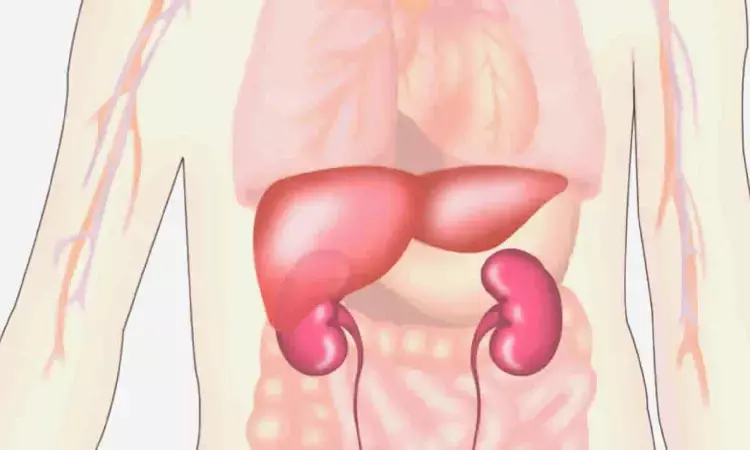- Home
- Medical news & Guidelines
- Anesthesiology
- Cardiology and CTVS
- Critical Care
- Dentistry
- Dermatology
- Diabetes and Endocrinology
- ENT
- Gastroenterology
- Medicine
- Nephrology
- Neurology
- Obstretics-Gynaecology
- Oncology
- Ophthalmology
- Orthopaedics
- Pediatrics-Neonatology
- Psychiatry
- Pulmonology
- Radiology
- Surgery
- Urology
- Laboratory Medicine
- Diet
- Nursing
- Paramedical
- Physiotherapy
- Health news
- Fact Check
- Bone Health Fact Check
- Brain Health Fact Check
- Cancer Related Fact Check
- Child Care Fact Check
- Dental and oral health fact check
- Diabetes and metabolic health fact check
- Diet and Nutrition Fact Check
- Eye and ENT Care Fact Check
- Fitness fact check
- Gut health fact check
- Heart health fact check
- Kidney health fact check
- Medical education fact check
- Men's health fact check
- Respiratory fact check
- Skin and hair care fact check
- Vaccine and Immunization fact check
- Women's health fact check
- AYUSH
- State News
- Andaman and Nicobar Islands
- Andhra Pradesh
- Arunachal Pradesh
- Assam
- Bihar
- Chandigarh
- Chattisgarh
- Dadra and Nagar Haveli
- Daman and Diu
- Delhi
- Goa
- Gujarat
- Haryana
- Himachal Pradesh
- Jammu & Kashmir
- Jharkhand
- Karnataka
- Kerala
- Ladakh
- Lakshadweep
- Madhya Pradesh
- Maharashtra
- Manipur
- Meghalaya
- Mizoram
- Nagaland
- Odisha
- Puducherry
- Punjab
- Rajasthan
- Sikkim
- Tamil Nadu
- Telangana
- Tripura
- Uttar Pradesh
- Uttrakhand
- West Bengal
- Medical Education
- Industry
Vasoactive treatments effective in patients with hepatorenal syndrome, study finds

Canada: Hepatorenal syndrome (HRS) is known to be associated with high rates of morbidity and mortality. A recent study published in Critical Care Medicine has found that a vasoactive drug terlipressin increases the reversal of hepatorenal syndrome compared to a placebo and may reduce mortality.
The study further states, "until the improvement in terlipressin access, initial norepinephrine administration may be more suitable than an initial trial with midodrine+octreotide. The review holds the potential to inform future guidelines and practices in HRS treatment."
Considering the uncertain evidence examining commonly used drug treatments, Tyler Pitre, Department of Internal Medicine, McMaster University, Hamilton, ON, Canada, and colleagues aimed to assess the comparative effectiveness of inpatient treatments for HRS by performing a network meta-analysis of randomized clinical trials (RCTs).
For this purpose, the researchers searched the online databases to identify eligible RCTs that enrolled patients with type 1 or 2 HRS. Data were extracted by pairs of reviewers.
The researchers assessed the risk of bias using the Cochrane tool for RCTs and certainty of evidence using the Grading of Recommendations, Assessment, Development, and Evaluations approach. The main outcomes were HRS reversal, all-cause mortality, and serious adverse events. 26 RCTs examining 1,736 patients were included out of 3,079 citations.
Based on the study, the researchers found the following:
- Based on the pooled analysis, terlipressin increases HRS reversal compared with placebo (142 reversals per 1,000 high certainty).
- Norepinephrine (112.7 reversals per 1,000) may increase HRS reversal compared with placebo (low certainty).
- The effect of midodrine+octreotide (67.8 reversals per 1,000; very low) on HRS reversal is uncertain.
- Terlipressin may reduce mortality compared with placebo (93.7 fewer deaths; low certainty).
- Terlipressin probably increases the risk of serious adverse events compared with placebo (20.4 more events per 1,000; moderate certainty).
The researchers conclude, "Our review has the potential to inform future guidelines and practice in the treatment of HRS."
Reference:
Pitre, Tyler MD1; Kiflen, Michel MSc2,3; Helmeczi, Wryan MD4; Dionne, Joanna C. PhD5,6; Rewa, Oleksa MD7; Bagshaw, Sean M. MD7; Needham-Nethercott, Natalie MD8,9; Alhazzani, Waleed MD5,6; Zeraatkar, Dena PhD6,10; Rochwerg, Bram MD5,6. The Comparative Effectiveness of Vasoactive Treatments for Hepatorenal Syndrome: A Systematic Review and Network Meta-Analysis. Critical Care Medicine: July 01, 2022 - Volume - Issue - 10.1097/CCM.0000000000005595 doi: 10.1097/CCM.0000000000005595
Dr Kamal Kant Kohli-MBBS, DTCD- a chest specialist with more than 30 years of practice and a flair for writing clinical articles, Dr Kamal Kant Kohli joined Medical Dialogues as a Chief Editor of Medical News. Besides writing articles, as an editor, he proofreads and verifies all the medical content published on Medical Dialogues including those coming from journals, studies,medical conferences,guidelines etc. Email: drkohli@medicaldialogues.in. Contact no. 011-43720751


